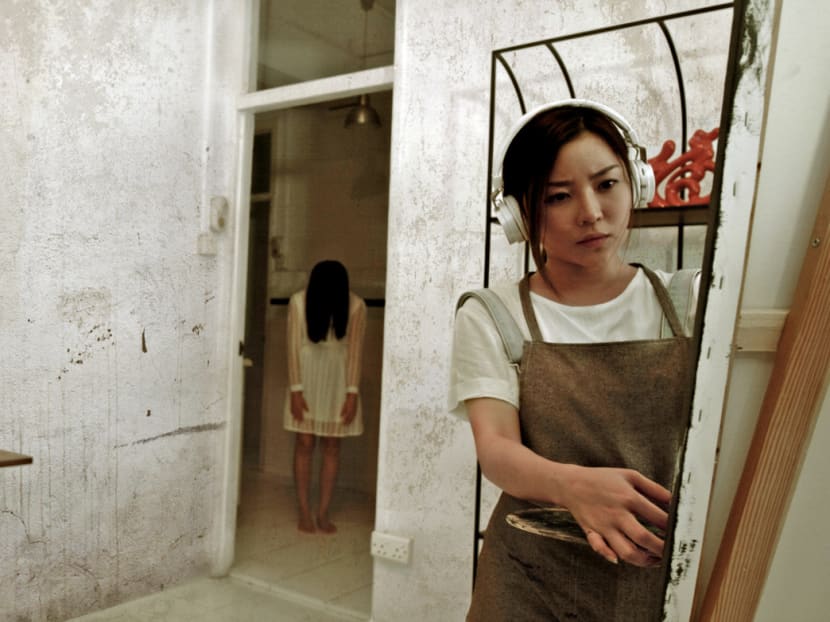Making movies that represent Singapore
If recent events in local film-making are anything to go by, it is safe to say that as more Singaporean directors’ perspectives come to be appreciated internationally, our movie-making scene is taking off in earnest.

A scene from Mike Koh’s dark psycho thriller The Tenants. The feature film will debut this year, supported by IMDA’s New Talent Feature Grant. Photo: IMDA
If recent events in local film-making are anything to go by, it is safe to say that as more Singaporean directors’ perspectives come to be appreciated internationally, our movie-making scene is taking off in earnest.
Last year, a number of local films enjoyed a fine international showing, prompting optimism within the industry for the year ahead. A Yellow Bird and Apprentice, for instance, competed on the global stage at the Cannes Film Festival.
Apprentice also won director Boo Junfeng the Rising Director Award at the 2016 Busan International Film Festival’s Asia Star Awards in October. In December, IMDA’s Media Education Scholarship scholar Alvin Lee, who is studying at the Beijing Film Academy, won the Best New Director award at the China Short Film Golden Hummingbird Awards for his project Seed.
This year is already shaping up well, with another local film’s world premiere slated in January. “Our New Talent Feature Grant recipient Kirsten Tan’s Pop Aye was also recently selected for the prestigious Sundance Film Festival,” said Joachim Ng, director of the Singapore Film Commission (SFC).
In his opinion, the reason for these films’ mileage is clear: “At the heart of these successes lie good storytelling, and of course, the passion and perseverance of our homegrown film-makers,” he said.
Tan says she gets a sense on the ground “that the scene has been revitalised, from the recent successes of Singaporean films at international film festivals”. Pop Aye, Tan’s debut film, about a disenchanted architect who bumps into his long-lost elephant on the streets of Bangkok, has been nominated in Sundance’s World Cinema Dramatic Competition section.
“There are quite a few local film-makers who are hard at work developing their first feature projects,” she said, adding that many of scripts will go into production this year.
Of course, that is not to say that only films that have been recognised internationally have value. “I think that there is a place for different types of cinema,” said A Yellow Bird director K Rajagopal.
“Some stories are more local and appeal greatly to a domestic audience. Some film-makers are starting to think about reaching out to global audiences by making films that are, on one hand, unique to our culture and region, while on the other hand, deal with contemporary issues facing our time and universal messages that speak to our generation today,” he said.
NEW BLOOD
As a sign of the scene’s healthy growth, 2017 will see several feature film debuts by new directors supported by IMDA’s New Talent Feature Grant. Apart from Tan’s film, there are also Mike Koh’s dark psycho thriller The Tenants and Tan Pin Pin’s documentary In Time To Come. There is also Abbas Akbhar’s romantic comedy Chennai2Singapore, which is a Singapore-India co-production.
Rajagopal, whose A Yellow Bird is a Singapore-France coproduction, identified such inter-country collaborations as a worldwide trend that is gaining momentum. “I think more film-makers are starting to embrace the coproduction model and the idea that collaboration with overseas partners is a great way to expand our industry and audience, while strengthening the cinematic identity of Singapore and South-east Asia,” he said.
Added Ng: “We firmly believe that our film-makers will also fly the Singapore flag high in the coming year.” At the same time, while “there are abundant opportunities for our talent to showcase their stories and find their way to audiences’ hearts”, he concedes that “there are challenges in a competitive and converging media landscape where audience preferences are diverse and evolving”.
One of these challenges, they said, is the age-old issue of censorship.
“It is still an issue because film-makers and distributors are constantly asking what’s going to pass and what’s not going to pass, and whether a film’s high rating will affect its commercial viability,” said Boo.
“So, the second-guessing of how the censors might judge a film and the self-censorship that comes with it is still quite prevalent. That isn’t very healthy in a creative industry.”
That being said, he added: “I am glad the IMDA has been more open to dialogue in recent years and I hope the engagement continues.”
To Tan, censorship “will always be a battleground between film-makers and authorities, not just in Singapore but regionally”.
“In Singapore, the population largely expects the government to take on the role of the moral arbiter in deciding what’s fit for consumption, but as our society matures, I believe some of that responsibility should be handed back to the people. In our pluralistic society, where many beliefs and world-views coexist, people need to start learning how to live with diverse opinions. We can’t always look to the government to clamp down on something we disagree with.”
GROWING HYPE
It is possible, of course, that the issue may become less of a stumbling block as Singaporeans’ interest in and understanding of films increase. This year, for instance, the 27th Singapore International Film Festival (SGIFF) saw close to 13,000 attendees at its events — an increase from 12,000 last year, according to SGIFF’s Executive Director Wahyuni Hadi.
And on top of sold-out screenings, “there was also an increase of over 50 per cent in attendance for the masterclasses and talks this year, a testament to the growing support and interest towards independent cinema”, she added.
Moreover, Rajagopal is of the opinion that 2016 was “a great year” for open-mindedness. “Look at the topics discussed in some of our films this year: Apprentice studies the position of capital punishment in our society; A Yellow Bird depicts discrimination and stigmatisation of minorities; even Lulu The Movie is a comic parody or satire on Chinese migrants. I think that the Singaporean cinema industry and government bodies are more open-minded than before,” he said.
“Perhaps our film-makers have addressed and approached social issues in a manner that neither compromises our intentions nor deliberately offends the value systems of the general public. This promotes a relationship of trust between film-maker and censor, where we are creating an artistic space for meaningful discourse rather than provoking political rhetoric or polemics.”
While things are looking up, the film-makers say there is still room for improvement. To this end, the importance of well-rounded support cannot be underestimated.
“I hope that local government or private institutions, film and art festivals like SGIFF, foundations, or any commissioning body, realise the important role they play to allow film-makers to raise the standard of filmmaking in Singapore,” Rajagopal said.
“Be it financial, exhibition, distribution or promotion-wise, support for films, particularly for independent films that have no opportunities for big business sponsorships, should only increase, and more risks should be taken,” he noted.
“As blockbuster cinema is becoming the dominant business in our theatres, there is less and less space for those outside the mainstream. It is our shared responsibility to ensure that there is space for diversity — otherwise, we lose the artistic value to the commercial value. We do not want to go one step forward and two steps back.” Additional reporting by Reena Devi







